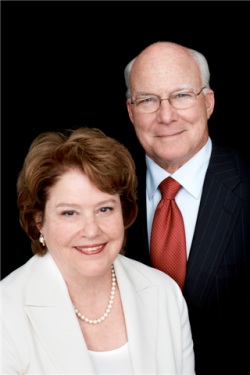 C. MICHAEL ARMSTRONG, the eldest of three sons born in pre-World War II Detroit, Michigan, was president of his high school senior class, and earned college football scholarships to the University of Michigan, Western Michigan University, and Miami University in Ohio. Mr. Armstrong attended Miami University, where he earned a Bachelor of Science degree in business in 1961, and he completed the Advanced Management Curriculum at Dartmouth Institute in 1976. He has been awarded honorary Doctor of Laws degrees from Pepperdine University, Loyola Marymount University, Shenandoah University, The Johns Hopkins University, and Miami University and also holds an honorary Doctor of Engineering degree from the Worcester Polytechnic Institute.
C. MICHAEL ARMSTRONG, the eldest of three sons born in pre-World War II Detroit, Michigan, was president of his high school senior class, and earned college football scholarships to the University of Michigan, Western Michigan University, and Miami University in Ohio. Mr. Armstrong attended Miami University, where he earned a Bachelor of Science degree in business in 1961, and he completed the Advanced Management Curriculum at Dartmouth Institute in 1976. He has been awarded honorary Doctor of Laws degrees from Pepperdine University, Loyola Marymount University, Shenandoah University, The Johns Hopkins University, and Miami University and also holds an honorary Doctor of Engineering degree from the Worcester Polytechnic Institute.
Mr. Armstrong began his 31-year career with IBM as a systems engineer and rose through the ranks to become senior vice president and lead international operations as Chairman of the Board of the IBM World Trade Corporation. At IBM, he was described by analysts and co-workers as strong, affable, and competitive. From IBM, Mr. Armstrong moved on to become Chairman and CEO of Hughes Electronics (a public company majority owned by General Motors Corporation), where he expedited development of DirecTV and implementation of the nation’s first digital broadband television system. He left Hughes to take the position of Chairman and CEO of AT&T and later served as Chairman of the Board of Comcast Corporation, retiring in 2004.
A strong supporter of higher education and community activities, Mr. Armstrong served as the Chairman of the Board of Trustees for Johns Hopkins Medicine, Johns Hopkins Health System Corporation, and The Johns Hopkins Hospital from July 2005 to June 2011 and again, from July 2012 to June 2013. He was also Vice Chairman of the Johns Hopkins University Board of Trustees and was involved in the School of Medicine’s implementation of the new Genes to Society curriculum. In 2005, through the generosity of him and his wife, Johns Hopkins opened the Anne and Mike Armstrong Medical Education Building, where the Genes to Society curriculum is taught. Long-time champions of patient safety and quality care, the Armstrongs again demonstrated their support of Johns Hopkins Medicine with a generous contribution to create the Armstrong Institute for Patient Safety and Quality in 2011.
Among his extensive civic and community activities, Mr. Armstrong served as chair of the President’s Export Council under President Bill Clinton, the U.S.-Japan Business Council, and the Federal Communications Commission’s Network Reliability and Interoperability Council. Additionally, he served as chair of the Homeland Security Task Force, the National Security Telecommunications Advisory Committee, and the Defense Policy Advisory Committee. Mr. Armstrong is co-founder and past president of Connecticut’s A Better Chance in Darien and past president of the Darien YMCA. He is a member of the advisory boards of the All Stars Project, Inc. in New York City and the Telluride Foundation, the Board of Directors of Artis—Naples, the Naples Neighborhood Health Clinic board, The Conference Board, The United States Marine Corp Scholarship Foundation Board of Directors, and is an emeritus member of the Johns Hopkins Medicine, Hospital, and Health System Boards of Trustees.
